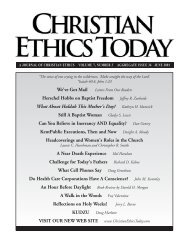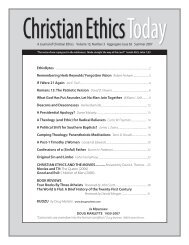Issue 052 PDF Version - Christian Ethics Today
Issue 052 PDF Version - Christian Ethics Today
Issue 052 PDF Version - Christian Ethics Today
You also want an ePaper? Increase the reach of your titles
YUMPU automatically turns print PDFs into web optimized ePapers that Google loves.
The phenomenal popularity of The Da Vinci Code and the<br />
record-breaking sales of the Left Behind series has led<br />
some in the news media to say that decoding the Bible has<br />
become a “fad.” But it’s no fad. We <strong>Christian</strong>s have been trying<br />
to decode the Bible for centuries.<br />
Some of our efforts to decode the Bible remind me of a<br />
humorous story about an obnoxious military officer. Still<br />
swaggering from his recent promotion to the rank of captain,<br />
he was addressing his troops. A private ran up to him with a<br />
message from headquarters. The captain, assuming it was<br />
another letter of congratulations, told the private to read it<br />
out loud. “But sir,” the private said, “You may wish to read<br />
this one privately.” “I gave you an order, son,” the captain<br />
barked, “Read it!” So the private read it, loud enough for all<br />
to hear.<br />
The message read: “Captain, You are proving to be the<br />
most incompetent officer that has ever served in the U.S.<br />
army. If you do not shape up within a week’s time, I shall<br />
remove you from command and reduce you in rank.”<br />
Signed: Colonel Smith.<br />
Immediately, the Captain said, “Good job, private. Now<br />
go and have that message decoded.”<br />
Unfortunately, some of our efforts to find “hidden”<br />
meanings in the Bible have been like that—vain attempts to<br />
avoid the obvious.<br />
For example, Jesus said in the Sermon on the Mount:<br />
“But if you do not forgive men their sins, your Father will<br />
not forgive your sins ” (Mt. 5:15). Hoping to “decode” that<br />
passage, I looked it up in some Bible commentaries.<br />
No luck. The commentaries just pointed out that Jesus<br />
made that statement to explain a line in the Lord’s Prayer:<br />
“Forgive us our sins as we forgive those who sin against us”<br />
(Mt. 5:12).<br />
What a scary thought.<br />
An even more disturbing passage many have tried to<br />
“decode” is the one where Jesus described the final judgment.<br />
He said we’re all going to be divided into two groups: those<br />
who helped others in need, and those who didn’t. And he<br />
specifically talked about worldly help—for those who need<br />
food, water, clothes, and shelter, and those who are sick,<br />
lonely, or in prison. Jesus indicated that those who engage in<br />
that kind of worldly charity are going to receive a heavenly<br />
16 • CHRISTMAS 2004 • CHRISTIAN ETHICS TODAY<br />
“Decoding” the Bible<br />
By John Scott, Dallas, Texas<br />
“Men stumble over the truth from time to time, but most pick themselves up and hurry off as if nothing happened.” Winston<br />
Churchill.<br />
“The obscure we see eventually. The completely obvious, it seems, takes longer.” Edward R. Murrow.<br />
reward. And those who don’t, won’t (Mt. 25:31-46).<br />
I started attending a Baptist church nine months before I<br />
was born. I’ve since heard thousands of sermons. But I have<br />
never heard a sermon based on that warning. One preacher<br />
mentioned it, but only to say we shouldn’t take it literally.<br />
But that same preacher insisted in another sermon that we<br />
should take the Genesis account of creation literally. I wondered:<br />
“Why would he take Genesis at its word, and not take<br />
Jesus at his word? Even if he’s right about the creation, that<br />
won’t matter at the judgment. But if he’s wrong about charity,<br />
that might be the only thing that does matter at the judgment.”<br />
I’ve heard hundreds of sermons saying that salvation is<br />
ours for the asking if we only profess a belief in certain facts<br />
about Jesus, and call him Lord. But Jesus said: “Not everyone<br />
who says to Me, ‘Lord, Lord,’ will enter the kingdom of<br />
heaven; but only he who actually does the will of My Father<br />
who is in heaven” (Mt. 7:21). And, “The gate is narrow and<br />
the way is hard, that leads to life, and those who find it are<br />
few” (Mt. 7:14). The <strong>Christian</strong> martyr Dietrich Bonhoeffer<br />
warned about a “comfortable <strong>Christian</strong>ity” and placing our<br />
hopes on a belief in “cheap grace.”<br />
It’s true that Paul said salvation comes through faith, and<br />
not from works (Eph. 2:8, 9). But he never said that salvation<br />
requires no works. We can’t do enough works to save ourselves,<br />
so there can be no salvation without God’s grace. But<br />
saying works are not enough, is not the same as saying works<br />
are not necessary. So it seems we have stretched Paul’s words<br />
beyond what he actually said, and then acted as if they<br />
trumped what Jesus said. That would appall Paul himself.<br />
The important question is: What did Paul mean by faith?<br />
Or, more accurately: What did he mean by the word later<br />
translated into English as “faith”?<br />
I’m just a layman, but I have read how many scholars<br />
have answered that question. I have found that Protestant<br />
and Catholic scholars, all across the fundamentalist-to-liberal<br />
spectrum, agree on this: a saving faith is not just intellectual<br />
assent to teachings about Jesus; it’s a lifetime commitment to<br />
obey the teachings of Jesus.<br />
Billy Graham called faith a “total commitment” and said,<br />
“There is a vast difference between intellectual belief and the<br />
total conversion that saves the soul.” 1 Dr. Foy Valentine,












